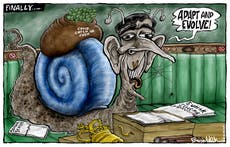Rishi Sunak’s Job Support Scheme arrived too late – Superman is human, after all
Sunak’s latest package could have been marketed by lastminute.com – and with unpopular decisions still to come, he knows he might not remain the man destined to succeed Johnson, writes Andrew Grice


For decades, Treasury economic forecasts were universally regarded as an expensive joke. They allowed successive chancellors to produce the figures to fit their budgets, rather than the other way round. You can guess on which side of the line they strayed.
When George Osborne set up the independent Office for Budget Responsibility (OBR) in 2010, he noted that Treasury predictions for the budget deficit three years ahead were out by an average of £40bn, with growth out by an average of £13bn.
Coronavirus has made such forecasting impossible. If Rishi Sunak had waited for the next OBR prediction, the economy might have disappeared in the meantime. So political judgements are back. Until this week, the chancellor’s economic and political touch was seen by Conservative MPs as the government’s one star in a gloomy year.
Now, something has changed. Sunak’s third version of his “winter economic plan,” even before the clocks go back, has removed some of his stardust. Superman is human, after all. Even some Tory admirers think the plan he unveiled a month ago was built on that traditional Treasury super-optimism. Sunak refused to extend his successful furlough scheme beyond 31 October. Its much less generous successor, his job support scheme, was built on his hope the UK had weathered the storm; he would protect “viable jobs” but a restructuring of the economy was inevitable. That was code for the loss of hundreds of thousands of so-called zombie jobs kept on life support by furlough.
Sunak was slow to realise that his original job support scheme would cost otherwise viable jobs, such as in firms not forced to close by local lockdowns but still suffering a catastrophic loss of business. Although the significant change of heart he announced on Thursday will save jobs, he would have saved more by acting sooner. Some employers will have cut jobs on the basis of last month’s version which, as the Resolution Foundation think tank was quick to point out, made it cheaper to keep one and sack one worker than put two people on short time.
Sunak’s retreat would have been greeted with screaming headlines about a U-turn if it had been made by a Labour chancellor. He managed – just – to avoid that fate. He should have gone the whole hog by guaranteeing 80 per cent of wages for people on short time. But that would have been government U-turn number 15 this year.
His expanded job support is closer to the furlough scheme than he would care to admit, as the Institute for Fiscal Studies pointed out. The think tank agreed with Labour’s criticism that the chancellor was playing “catch-up” with rising infection numbers and a stalled economic recovery.
Sunak’s latest package could have been marketed by lastminute.com. If the government was already planning to help struggling businesses in the tier 2 high alert category, why on earth didn’t it tell Andy Burnham? Then ministers could have avoided 10 days of messy, fruitless negotiations with the Greater Manchester mayor. Backdating grants to businesses in the region will not alter the belief in the north that ministers stepped in only when London entered tier 2. It rings true: alarm bells were ringing about the capital’s large hospitality sector.
Why did Sunak get it wrong? The chancellor gave us a clue in Thursday’s press conference with Boris Johnson, when he said it was right to “have one eye on the long-term public finances”. He added: "It is clearly not sustainable to carry on acting in this way forever, so as we continue intervening in the economy, it is right that it is targeted and effective.”
As one of his allies explained it to me: “He might have thrown £200bn at the economy, but he is much more of a fiscal hawk than people realise." Sunak knows the day of reckoning will come; he was reluctant to make it even more difficult. But he has now added about another £13bn to the UK’s eye-watering debt levels. He has learnt a painful lesson: while he and the Treasury can't wait to get on with balancing the books, it can’t be rushed. It doesn’t need to be, with interest rates at an historic low.
Sunak remains the clear frontrunner to succeed Johnson, though he knows the history books are full of ex-future Tory leaders such as Michael Heseltine, Kenneth Clarke, Michael Portillo and David Davis.
Some of the shine was always going to come off the Tories’ golden boy, not least because whoever the media builds up, it will try to knock down.
With many unpopular decisions to come – including tax rises opposed by many in his party whose support he will need one day – he knows he might not remain the king over the water destined to succeed Johnson.



Join our commenting forum
Join thought-provoking conversations, follow other Independent readers and see their replies
Comments